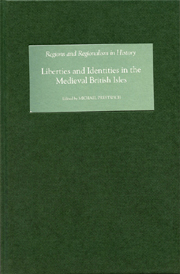Book contents
- Frontmatter
- Contents
- List of maps
- Abbreviations
- Introduction
- 1 States, liberties and communities in medieval Britain and Ireland (c.1100–1400)
- 2 Arbitration and Anglo-Scottish border law in the later middle ages
- 3 Peacekeepers and lawbreakers in medieval Northumberland, c.1200–c.1500
- 4 War, lordship, and community in the liberty of Norhamshire
- 5 The lordship of Richmond in the later middle ages
- 6 ‘Tam infra libertates quam extra’: Liberties and military recruitment
- 7 Neighbours from Hell? Living with Tynedale and Redesdale, 1489–1547
- 8 Striving for Marcher liberties: The Corbets of Caus in the thirteenth century
- 9 Franchises north of the border: Baronies and regalities in medieval Scotland
- 10 The liberties of Ireland in the reign of Edward I
- Index
5 - The lordship of Richmond in the later middle ages
Published online by Cambridge University Press: 12 September 2012
- Frontmatter
- Contents
- List of maps
- Abbreviations
- Introduction
- 1 States, liberties and communities in medieval Britain and Ireland (c.1100–1400)
- 2 Arbitration and Anglo-Scottish border law in the later middle ages
- 3 Peacekeepers and lawbreakers in medieval Northumberland, c.1200–c.1500
- 4 War, lordship, and community in the liberty of Norhamshire
- 5 The lordship of Richmond in the later middle ages
- 6 ‘Tam infra libertates quam extra’: Liberties and military recruitment
- 7 Neighbours from Hell? Living with Tynedale and Redesdale, 1489–1547
- 8 Striving for Marcher liberties: The Corbets of Caus in the thirteenth century
- 9 Franchises north of the border: Baronies and regalities in medieval Scotland
- 10 The liberties of Ireland in the reign of Edward I
- Index
Summary
Bastard feudalism was the focus of intense debate and scrutiny in the second half of the twentieth century. The remnants of feudalism were looked upon as anachronistic and without significance. Although retainers were identified by K.B. McFarlane as unpredictable, changing their allegiance to secure more lucrative rewards or more advantageous positions, current research has established that they were more frequently found to be loyal and devoted servants to their respective lords. The contracts drawn up as an essential feature of the process of retaining can now be seen as an integral part of a wider context of lordship, household structure, tenantry and a circle of patronage which was of use not only to the lord as the employer but also to the retainer for his personal and family security. G.L. Harriss defined the ways in which this society was structured by exploring both the vertical bonds of lordship in the form of service within baronial affinities, and equally the horizontal ties which bound geographical communities together. When Peter Coss, David Crouch and David Carpenter, and Michael Hicks revisited this argument during the 1990s, research had also revealed that cash payments for military service had existed as early as 1140, and that there was strong support for the notion that feudalism and bastard feudalism had, in fact, survived side by side for some time. The debate concerning the nature and significance of this ‘new feudalism’ as Simon Walker called it has dominated the discussion of political and military society in later medieval England.
- Type
- Chapter
- Information
- Liberties and Identities in the Medieval British Isles , pp. 98 - 110Publisher: Boydell & BrewerPrint publication year: 2008



